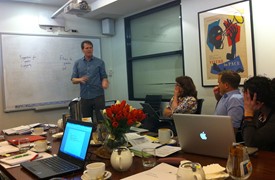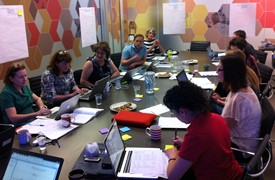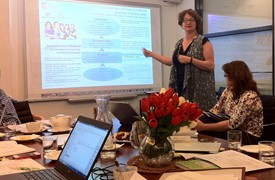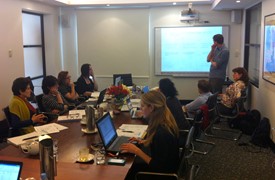




Who are we?
-
A/Prof. Martin Cake
Project Leader; Team Member: Veterinary resilience study
BSc, BVMS, PhD. Associate Professor Martin Cake teaches veterinary and comparative anatomy, and has coordinated development of the Veterinary Professional Life program at Murdoch University, Western Australia. read more...He recently collaborated with Professor Susan Rhind on the Best Evidence Medical Education (BEME) Review "Which non-technical veterinary graduate attributes are important? Consensus and evidence". He was an associate on the 2007-2009 Australian Learning and Teaching Council (ALTC) project "Curriculum Development and Assessment Methods to Enhance Communication and Life Skills in Veterinary Students", which directly informs this VetSet2Go project. Martin was co-awarded an ALTC Citation for Outstanding Contribution to Student Learning for his leadership in Murdoch’s Veterinary Professional Life program. His research interests include comparative anatomy, connective tissue biology (bone and cartilage), and veterinary education. -
Dr Melinda Bell
Lead: Case studies and stakeholder perceptions study
BSc, BVMS, MANZCVS. Dr Melinda Bell is a Lecturer in Small Animal Primary Care, College of Veterinary Medicine, Murdoch University, Western Australia. read more...Melinda is an early career researcher; her PhD is affiliated with this VetSet2Go project, in the area of veterinary graduate / employer outcomes. She was an associate on the 2007-2009 ALTC project “Curriculum Development and Assessment Methods to Enhance Communication and Life Skills in Veterinary Students”. Melinda was co-awarded an ALTC Citation for Outstanding Contribution to Student Learning for her leadership in Murdoch’s Veterinary Professional Life program. In 1998, she attained Membership to the Australian College of Veterinary Scientists, in the Medicine of Cats. Melinda’s special areas of interest are assisting her veterinary students with their professional communication skills and coordinating their extramural placements. -
Dr Laura King
Project Manager & Research Assistant
BEng(Hons1), CPEng, PhD. Dr Laura King is a project manager and research assistant at Murdoch University, Western Australia. read more...Laura has worked for a decade as a chartered professional engineer / project manager in various fields of environmental / life sciences for government, academia, industry and consultancy. She also holds a PhD in professional writing and research, and is a sessional academic in professional and creative writing, editing and communication. Laura has been a finalist for the WA Young Achiever (Career) and Young Engineer of the Year awards for her work undertaken as chairperson of State and Federal committees for Engineers Australia, which provided experience in project administration, event organisation and website maintenance. -
A/Prof. Caroline Mansfield
Team Member: Veterinary resilience study
Caroline.Mansfield@murdoch.edu.au
BA, Grad DipEd, MEd, PhD. Associate Professor Caroline Mansfield is a Senior Lecturer and the Associate Dean of Research in the School of Education, Murdoch University, Western Australia. read more...She coordinates undergraduate and postgraduate units focusing on learning, teaching and assessment processes, collaborative learning and motivation. As a former secondary school teacher, Caroline’s research broadly focuses on teachers and students in learning contexts. Recent national and international research projects have investigated teacher resilience, teaching and learning in higher education settings, teacher motivation, development of teacher beliefs, and teacher efficacy. Caroline has received awards of excellence for both teaching and research. From 2009-2012 she was leader of the ALTC-funded project “Keeping Cool: Embedding Resilience in Initial Teacher Education Curriculum”, which inspired the OLT project "Building Resilience in Teacher Education (BRiTE)" (www.brite.edu.au). She is currently completing an OLT Fellowship entitled "Staying BRiTE: Promoting Resilience in Higher Education" (www.stayingbrite.edu.au). -
Dr Jennifer Mills
External Evaluator
BVSc, MSc, Dip ClinPath, DipEd (Tertiary & Adult), PhD. Dr Jennifer Mills is a Senior Lecturer in Clinical Pathology at Murdoch University, Western Australia. read more...She led the 2007-2009 ALTC project “Curriculum Development and Assessment Methods to Enhance Communication and Life Skills in Veterinary Students”, which advanced veterinary communication within Australian schools and seeded a community of veterinary ‘soft skill’ educators. This VetSet2Go project will reinvigorate said community and provide an assessment focus to complement the 2007-2009 ALTC project. As convenor of the first Australian Veterinary Education Symposium (AVES) in 2009, and a recognised international expert on veterinary communication, Jenny is well placed to conduct external evaluation of this project, as specified by OLT guidelines. -
Dr Daniel Schull
Lead: Employer expectations study
University of Queensland profile
BVSc(Hons), PhD, MPhil, GCEd(HE), Dip Pract Mgt. Dr Daniel Schull is a Senior Lecturer in Veterinary Professional Studies at The University of Queensland. read more...Daniel contributes to the professional studies theme within the Bachelor of Veterinary Science curriculum and was an associate on the 2007-2009 ALTC project “Curriculum Development and Assessment Methods to Enhance Communication and Life Skills in Veterinary Students”. -
Dr Eva King
Team Member: Employer expectations study
BVSc, PhD candidate. Dr Eva King is a co-facilitator of the Clinical Communication Skills Workshops in the School of Veterinary Science at The University of Queensland, Australia. read more...She graduated from the University of Queensland Veterinary School in 1991 and worked in mixed practice in North Queensland before moving to the United Kingdom. Eva then worked as a locum in small animal practices throughout England for 2½ years before returning to Australia and purchasing a small animal veterinary practice on the Sunshine Coast. Over the 18 years that she owned this business, her responsibilities included recruitment and management of recent veterinary graduates, nursing and reception staff. In 2010, Eva joined the UQ School of Veterinary Science as a co-facilitator of the Clinical Communication Skills Workshops, where she observed that times had changed—there were a lot more students, and a large proportion of international students, for whom English was not a primary language. This sparked an interest in international student education and so, in 2013, Eva embarked upon a PhD project exploring the influence of language and culture on learning in authentic clinical workplaces, using qualitative methodology (grounded theory). She is currently a research assistant on another OLT project, “Bringing the Learning Home—extension project”, which is exploring outbound student mobility in relation to graduate employability and developing a resource to assist students to make the most of their international study abroad experiences. -
Dr Wendy Hamood
Team Member: Employer expectations study
University of Adelaide profile
BSc, BVMS, GCHEd, GCOnlineLearning. Dr Wendy Hamood is an Extramural Studies Coordinator, School of Animal and Veterinary Science, University of Adelaide. read more...She has 20 years of experience working in veterinary practice in South Australia. Wendy's experience includes seven years in rural mixed animal practice, followed by a combination of emergency after-hours, locum and regular part-time work. Wendy embraces creating and contributing to a positive, team-based work culture to meet organisation goals. She has been responsible for developing and coordinating extramural animal husbandry and clinical placements for veterinary students in addition to supporting animal science students gain work-based learning experiences. Her research interests include work-integrated learning, teaching reflection and sensitive subjects, mental health, stakeholder engagement, and linking assessment to employability. -
Dr Adele Feakes
Team Member: Employer expectations study
University of Adelaide profile
BVSc(Hons1), GCHEd, PhD candidate. Dr Adele Feakes is a Lecturer in Veterinary Practice Management, School of Animal and Veterinary Science, University of Adelaide. read more...She led the Office of Learning and Teaching (OLT) 2013 Seed Grant “Reshaping Veterinary Business Curricula to Improve Graduate’s Business Skills: A Shared Resource for Educators”. She has served as a Director on the Board of the Australian Veterinary Association (AVA) and is currently President of their special interest group: Veterinarians in Education, Research and Academia (VERA). Adele’s teaching and research interests include career sector intent, entrepreneurial intent and development of entrepreneurial capabilities in university students and farmers in developing countries. Prior to becoming an academic, Adele was Principal of a successful five-veterinarian rural mixed practice for 24 years. Adele’s caseload in rural practice focused on production animals, horses and alpaca, especially reproduction. Her entrepreneurial bend was expressed in aligning the capabilities of the practice to client needs, including development of the largest sheep faecal egg counting laboratory in South Australia, reproductive services for horses, cattle, sheep, alpaca and goats and a dairy discussion group. The practice hosted many students from Australian and overseas veterinary schools, and employed many graduates. Adele has also worked in emergency practice, as a contract On Plant Veterinary Officer for the Australian Quarantine Inspection Service (AQIS), and currently works in urban practice on a regular sessional basis. -
Dr Michelle McArthur
Co-Lead: Veterinary resilience study
Michelle.McArthur@adelaide.edu.au
University of Adelaide profile
BA(Psych) Hons, DClinPsych. Dr Michelle McArthur is a Clinical Psychologist and a Senior Lecturer in Veterinary Skills (Communication) in the School of Animal and Veterinary Sciences, University of Adelaide, Australia. read more...Her teaching and research interests include human-animal relationships, methods for teaching and learning clinical communication skills, as well as veterinarian and veterinary student mental health and wellbeing. Michelle also works in private practice as a clinical psychologist. -
A/Prof. Susan Matthew
Co-Lead: Veterinary resilience study
BSc(Vet)(Hons), BVSc(Hons), PhD, GradCertEdStud(HigherEd). Associate Professor Susan Matthew is the Associate Chair of Veterinary Medical Education at Washington State University in the USA. read more...Susan has a PhD in veterinary education and works collaboratively to lead international veterinary curriculum research, innovation and development. She is involved in research into the use of the flipped technique in veterinary education, development of innovate online resources to teach veterinary professional practice, investigating expressions of empathy in veterinary clinical consultations, and outcomes assessment of veterinary education. Susan was awarded a joint Carrick Citation in 2007 for the development of authentic, varied and rigorous assessment procedures that foster independent and lifelong learning in veterinary professional environments. In 2007-2009, she was a Project Associate of the ALTC project investigating Curriculum Development and Assessment Methods to Enhance Communication and Life Skills in Veterinary Students. In 2011, Susan was awarded a Social Inclusion Scholarship by the Institute for Teaching and Learning at The University of Sydney, which enabled her to broaden her understanding of the impact of diverse student backgrounds on learning outcomes. Her teaching focuses on veterinary clinical communication and faculty development in teaching veterinary science. Susan is currently working with graduate students conducting research into veterinary education and outcomes assessment. -
Dr Sanaa Zaki
Team Member: Veterinary resilience study
BVSc (Hons), PhD, MANZCVSc, GradCertEdStud (Higher Ed), MANZCVSc. Dr Sanaa Zaki is Senior Lecturer in Professional Practice and Academic Advisor (Admissions) in the Sydney School of Veterinary Science, at the University of Sydney. read more...She is the academic leader of the Professional Practice curriculum and also coordinates the DVM Orientation and Leadership program. Sanaa’s teaching interests include animal welfare, ethical reasoning and self-care. Sanaa is also a veterinary anaesthetist, and member by examination of the Australian & New Zealand College of Veterinary Scientists, Anaesthesia & Critical Care Chapter. She commenced her academic career in 2002 as a Lecturer in Veterinary Anaesthesia, combining teaching, clinical service and clinical research activities, and completed a Graduate Certificate in Educational Studies (Higher Education) in 2005. In 2017, Sanaa completed a PhD investigating mechanisms of osteoarthritis pain. Her research interests are diverse and include veterinary education, resilience and chronic pain. -
Prof. Susan Rhind
Lead: Client expectations study
University of Edinburgh profile
BVMS, PhD, FRCPath, PFHEA, MRCV. Professor Susan Rhind is Chair of Veterinary Medical Education and Director of Veterinary Teaching at the Royal (Dick) School of Veterinary Studies, University of Edinburgh, Scotland. read more...She is Fellow of the Royal College of Pathologists (FRCPath) and was the first veterinarian to become Principal Fellow of the Higher Education Academy (PFHEA) in 2014. She graduated from Glasgow University Veterinary School and, following 3 years in general veterinary practice, she studied for a PhD in immunology at the University of Edinburgh. She subsequently specialised as a pathologist and has since developed a major interest in all aspects of veterinary education. Her current areas of research include assessment and feedback, e-learning, curriculum design and the student experience, and the use of models to support veterinary education. She has published widely in pathology and in veterinary education, and regularly speaks at national and international conferences. Susan collaborated with A/Prof. Martin Cake on the 2015 Best Evidence Medical Education (BEME) Review “Which non-technical veterinary graduate attributes are important? Consensus and evidence”. -
Dr Kirsty Hughes
Team Member: Client expectations study
University of Edinburgh profile
BVM&S, BSc, MSc, PhD, FHEA, MRCVS. Dr Kirsty Hughes is a research assistant in Veterinary Medical Education at the Royal (Dick) School of Veterinary Studies, University of Edinburgh, Scotland. read more...She qualified as a veterinary surgeon from the University of Edinburgh’s Royal (Dick) School of Veterinary Studies in 2007 with an Intercalated BSc (Hons) in Microbiology and Infection (2004-2005). Kirsty then worked in private practice prior to returning to the University of Edinburgh in 2008 to pursue a Master of Science by Research in Veterinary Education. Her Masters research was focused on veterinary students’ expectations and experience of academic feedback. She then revisited her interest in infectious disease from 2009-2013 during her PhD at the Scottish Rural College (SRUC) and the University of York, where she investigated the transmission of Escherichia coli O157:H7 in cattle. Following completion of her PhD in January 2014, Kirsty began her current role as a Research Assistant in Veterinary Medical Education at the University of Edinburgh. She is involved in a number of areas of educational research, including the student experience, assessment and feedback, e-learning and student wellbeing. Kirsty is a Fellow of the Higher Education Academy (FHEA). -
Prof. Liz Mossop
Team Member: Client expectations study
University of Nottingham profile
BVM&S, MMedSci(Clin Ed), PhD, MAcadMEd, MRCVS. Professor Liz Mossop is a Professor of Veterinary Education and Sub-Dean of Teaching, Learning and Assessment in the School of Veterinary Medicine and Science, University of Nottingham. read more...She graduated with BVM&S from the University of Edinburgh’s Royal (Dick) Veterinary College in 2000 to gain her membership of the Royal College of Veterinary Surgeons. Liz worked in mixed but predominantly equine practice for 6 years before developing an interest in veterinary education and beginning a Masters degree in Clinical Education, which she was awarded in 2007. She joined the School of Veterinary Medicine and Science (SVMS) at the University of Nottingham in 2006. Liz’s expertise is the design and delivery of the veterinary curriculum, with a particular emphasis on the teaching and assessment of professionalism and professional skills to veterinary students. This includes business skills, decision making and ethical reasoning. She represents the University of Nottingham on the National Unit for the Advancement of Veterinary Communication Skills (NUVACs) committee, which oversees communication skills training at veterinary schools. She was awarded the Lord Dearing Award for outstanding teaching in 2007 and again in 2012. Liz obtained her PhD in Veterinary Education in 2012 for her thesis “Defining and Teaching Veterinary Professionalism”. She holds Membership of the Academy of Medical Educators (AMEE). -
Dr Kate Cobb
Team Member: Client expectations study
University of Nottingham profile
BVetMed, PGCE, MMedSci, PhD, SFHEA, MRCVS. Dr Kate Cobb is a Lecturer in Veterinary Science (Learning and Assessment) in the School of Veterinary Medicine and Science, University of Nottingham. read more...She qualified from the Royal Veterinary College in 1996 with a Bachelor's degree in Veterinary Medicine and became a member of the Royal College of Veterinary Surgeons. She has completed a Postgraduate Certificate in Education (PGCE) in secondary science, a Masters in Medical Education (2010) and is currently working towards a PhD in the educational impact of assessment in veterinary students. She has worked in first-opinion, small animal veterinary practice and in secondary education, teaching science to 11-19 year olds. Kate’s responsibilities have included design and delivery of the preliminary year course, teaching on the five year course, curriculum review and evaluation of the assessment strategy.